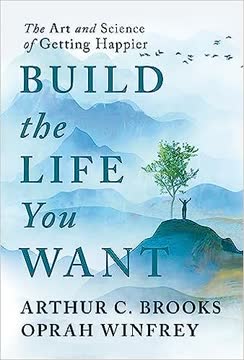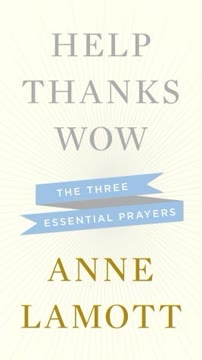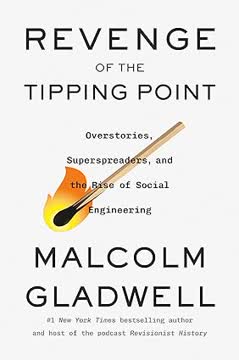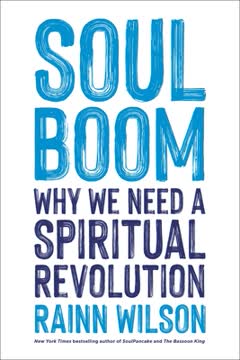Key Takeaways
1. Embrace the Twofold Path: Personal Growth and Societal Transformation
We need a change of heart, a reframing of all our conceptions and a new orientation of our activities.
Inner and Outer Journeys. The spiritual path isn't solely about individual enlightenment; it's equally about contributing to the betterment of society. Like the yin and yang, these two aspects are interconnected and mutually reinforcing. Personal growth equips us to serve others more effectively, while service enriches our own spiritual development.
Kung Fu and Star Trek. The author uses the analogy of Kung Fu and Star Trek to illustrate the twofold path. Kung Fu represents the personal journey of self-mastery, while Star Trek symbolizes the collective journey toward a more evolved and unified society. Both are essential for a complete spiritual life.
Practical Application. This means actively seeking personal growth through practices like meditation, prayer, and self-reflection, while also engaging in acts of service, advocacy, and social justice. It's about integrating inner peace with outward action, striving to be both a better person and a force for good in the world.
2. Recognize the Plethora of Pandemics Plaguing Humanity
As all the existing organizational systems around us break down, we need answers.
Beyond Physical Health. The world faces a multitude of interconnected crises beyond physical health, including mental health, racism, sexism, materialism, economic inequality, nationalism, militarism, and climate change. These "pandemics" are not isolated issues but symptoms of a deeper spiritual imbalance.
Interconnectedness of Crises. These pandemics are interconnected, with greed fueling materialism, which exacerbates economic inequality, leading to racism and sexism. These injustices contribute to loneliness and mental health struggles, creating a vicious cycle.
Spiritual Root Causes. The author argues that these pandemics are fundamentally spiritual in nature, stemming from selfishness, a lack of compassion, and a disconnect from our shared humanity. Addressing these issues requires a shift in perspective and a focus on spiritual solutions.
3. Reframe Life Through the Lens of Death
Live as if you were to die tomorrow. Learn as if you were to live forever.
Mortality as a Motivator. Contemplating death can provide clarity and urgency to life, helping us prioritize what truly matters. Ancient practices like memento mori and Buddhist death meditations encourage us to live more fully in the present moment.
Shifting Priorities. Facing death often leads to a profound shift in priorities, with individuals focusing on gratitude, love, and connection rather than material possessions or career achievements. This perspective can help us re-evaluate our own lives and make more meaningful choices.
Soul Growth. The author suggests that life is a "soul-enriching factory," where we develop virtues and spiritual qualities that transcend our physical existence. Hardships and suffering can serve as catalysts for growth, fostering compassion, wisdom, and resilience.
4. Reimagine the Notorious G.O.D.
Be still, and know that I am God.
Beyond Anthropomorphism. Traditional conceptions of God as a judgmental "Sky-Daddy" are often limiting and problematic. The author encourages a reimagining of God as an unknowable essence, a creative force, or the consciousness of the universe.
Atheism and the Simulation Hypothesis. The author acknowledges the validity of atheistic perspectives and explores the simulation hypothesis as a potential bridge between science and spirituality. The idea that our reality is a simulation overseen by a higher intelligence offers a new way to conceive of the divine.
Wakan Tanka and the Great Mystery. The author finds inspiration in the Native American concept of Wakan Tanka, a creative force that permeates all of nature. This perspective emphasizes the interconnectedness of all things and the presence of the divine within the world, not above it.
5. Seek the Sacred Through Pilgrimage and Reverence
Only when we tarry do we touch the holy.
Beyond Religious Sites. Sacredness isn't limited to traditional religious sites; it can be found in everyday places and experiences. A meaningful conversation, a moment of connection with nature, or an act of kindness can all be sacred.
Pilgrimage as a Practice. Pilgrimage involves intentionally seeking out places or experiences that evoke a sense of awe, wonder, and reverence. This practice can help us reconnect with our spiritual selves and gain a new perspective on life.
Cultivating Reverence. Reverence involves approaching the world with humility, respect, and a sense of wonder. It's about recognizing the inherent value and interconnectedness of all things, from the smallest flower to the vastness of the universe.
6. Transcend the Limitations of Religion
Literature is news that stays news.
Religion's Dual Nature. Religion has been both a source of great good and immense harm throughout history. While it can inspire compassion, unity, and service, it has also been used to justify violence, oppression, and division.
The Nones and the Search for Meaning. The rise of the "Nones" – those who identify as spiritual but not religious – reflects a growing dissatisfaction with traditional religious institutions. These individuals often seek meaning and connection through personal experiences, nature, and secular communities.
Universal Truths. Despite their differences, the world's major religions share common threads, including a belief in a higher power, life after death, the power of prayer, the importance of love and compassion, and the call to serve others. These universal truths can provide a foundation for a more inclusive and meaningful spirituality.
7. Build a New Mythology of Hope and Unity
We are not human beings having a spiritual experience; we are spiritual beings having a human experience.
Beyond the "Survival of the Fittest." The dominant narrative of human history often emphasizes competition, conquest, and the pursuit of power. The author calls for a new mythology that celebrates cooperation, compassion, and the interconnectedness of all life.
The Simulation Hypothesis. The simulation hypothesis, the idea that our reality is a computer-generated simulation, offers a new way to understand the nature of existence and our place in the universe. It suggests that our physical world is an illusion and that our true reality lies beyond the veil.
A New Story of Humanity. This new mythology would emphasize our shared humanity, our capacity for love and compassion, and our potential to create a more just and sustainable world. It would be a story of hope, resilience, and the triumph of the human spirit.
8. Cultivate Joy and Combat Cynicism
All goes onward and outward, nothing collapses, And to die is different from what any one supposed, and luckier.
Cynicism as a Pandemic. Cynicism, a pervasive sense of distrust and negativity, is a major obstacle to progress and well-being. It can lead to apathy, inaction, and a belief that change is impossible.
Joy as a Superpower. Joy, unlike mere optimism, acknowledges the reality of suffering but chooses to focus on hope, connection, and the beauty of life. It's a force that empowers us to overcome challenges and create positive change.
Finding Unity in Diversity. The author emphasizes the importance of finding "precious points of unity" where contrasting perspectives overlap. By focusing on shared values and common goals, we can bridge divides and build a more cohesive society.
9. Dismantle Adversarial Systems
The ultimate work of civilization is the unfolding of ever-deeper spiritual understanding.
Beyond Competition. Many of our societal systems, from politics to economics, are based on competition and self-interest. These adversarial systems often perpetuate inequality, division, and conflict.
The Baha'i Election Model. The Baha'i Faith offers an alternative model for elections that emphasizes consultation, consensus-building, and selfless service. This approach prioritizes qualities like loyalty, devotion, and a well-trained mind over political maneuvering and self-promotion.
Reimagining Systems. The author calls for a reimagining of all our societal systems, from healthcare to education to criminal justice, based on principles of cooperation, compassion, and justice. This requires a fundamental shift in mindset and a willingness to challenge the status quo.
10. Build, Don't Just Protest: Create New Models
The needs of the many outweigh the needs of the few.
Beyond Opposition. While protesting injustice is important, it's not enough to simply tear down existing systems. We must also build new models that embody our values and offer a more sustainable and equitable way forward.
The Power of Creation. The author encourages readers to channel their energy into creating positive alternatives, whether it's starting a community garden, launching a social enterprise, or developing a new technology that addresses a pressing social need.
The Importance of Action. The spiritual path isn't just about inner reflection; it's about taking action in the world. By translating our values into concrete actions, we can create a ripple effect that inspires others and contributes to a more just and compassionate society.
11. Systematize Grassroots Movements
All men have been created to carry forward an ever-advancing civilization.
From Passion to Structure. Grassroots movements often start with passion and energy, but they need structure and organization to achieve lasting impact. This involves developing clear goals, strategies, and systems for accountability.
Building Sustainable Movements. To create lasting change, grassroots movements need to build sustainable organizations that can attract funding, recruit volunteers, and advocate for policy changes. This requires a long-term vision and a commitment to building infrastructure.
The Power of Collective Action. The author emphasizes the importance of collective action, where individuals come together to amplify their voices and create a force for change. This involves building bridges across divides and working collaboratively towards shared goals.
12. Invest in Virtues Education and Radical Compassion
Let your heart burn with loving-kindness for all who may cross your path.
Beyond Knowledge. Education should not only focus on knowledge and skills but also on character development and the cultivation of virtues. This involves teaching children and adults about empathy, compassion, justice, and service.
Radical Compassion. The author calls for a radical form of compassion that extends to all beings, including those who are different from us or who hold opposing views. This involves actively seeking to understand others' perspectives and treating everyone with dignity and respect.
A Spiritual Revolution. By investing in virtues education and cultivating radical compassion, we can create a spiritual revolution that transforms individuals and societies. This revolution is not about imposing a new set of beliefs but about awakening the inherent goodness within each of us and creating a world where love, justice, and unity prevail.
Last updated:
FAQ
What is Soul Boom: Why We Need a Spiritual Revolution by Rainn Wilson about?
- Exploration of spirituality: The book examines spirituality as a concern for the human soul, distinct from material pursuits, and explores how this focus can address both personal and societal crises.
- Diagnosis of global issues: Wilson connects modern problems—mental health decline, polarization, environmental destruction, and social injustice—to spiritual roots, arguing for spiritual solutions.
- Personal and universal journey: Blending memoir, humor, and cultural analysis, Wilson shares his own spiritual search while inviting readers to reimagine spirituality for today’s world.
- Call for transformation: The book aims to spark a spiritual revolution, inspiring both individual growth and collective healing.
Why should I read Soul Boom: Why We Need a Spiritual Revolution by Rainn Wilson?
- Modern spiritual insight: The book bridges ancient wisdom and contemporary challenges, offering a relatable perspective for those disillusioned with organized religion but still seeking meaning.
- Practical and hopeful: Wilson provides actionable ideas, new spiritual practices, and a vision for joyful, compassionate community-building.
- Engaging and accessible: Written with humor and personal anecdotes, the book makes profound topics approachable and entertaining.
- Inspiration for change: Readers are encouraged to participate in a spiritual revolution that addresses both inner life and societal transformation.
What are the key takeaways from Soul Boom: Why We Need a Spiritual Revolution by Rainn Wilson?
- Spirituality is essential: True transformation—personal and societal—requires spiritual tools and perspectives, not just material or political solutions.
- Twofold moral purpose: The book emphasizes both personal enlightenment and collective service as intertwined goals for a better world.
- Compassion and community: Radical compassion, virtues education, and inclusive community are central to healing modern crises.
- New mythology and systems: Wilson advocates for creating new, hopeful stories and social structures rooted in spiritual principles.
How does Rainn Wilson define spirituality versus religion in Soul Boom?
- Spirituality as universal quest: Spirituality is described as a personal and collective journey toward meaning, connection, and the cultivation of divine qualities.
- Religion as institution: Religion is seen as organized practices, rituals, and dogma, which can both help and hinder spiritual growth.
- Inclusive approach: Wilson highlights the growing "spiritual but not religious" demographic, advocating for spiritual tools beyond institutional boundaries.
- Focus on transformation: The emphasis is on inner change and service to others, rather than adherence to rigid doctrines.
What are the "twofold moral purpose" and foundational principles of spirituality in Soul Boom?
- Personal transformation: Achieving inner peace, wisdom, and mastery over ego is the first path, fostering individual enlightenment.
- Collective evolution: The second path is about advancing humanity through justice, unity, and service, aiming for a more loving and equitable world.
- Interdependence: Personal and collective growth are mutually reinforcing, each deepening the other.
- Ten foundational principles: Wilson identifies core religious values—such as belief in a higher power, life after death, prayer, community, love, compassion, service, and purpose—as essential for spiritual revolution.
What global crises or "pandemics" does Rainn Wilson connect to spirituality in Soul Boom?
- Mental health crisis: Rising anxiety, depression, and loneliness are framed as spiritual pandemics needing more than medical solutions.
- Systemic injustice: Racism, sexism, and economic inequality are described as spiritual diseases rooted in "otherness" and materialism.
- Environmental and political dysfunction: Climate change and adversarial politics are linked to spiritual imbalances and a lack of collective consciousness.
- Need for new values: Wilson argues that only a shift in spiritual awareness can address these interconnected crises.
How does Rainn Wilson address the decline of organized religion and the rise of the "spiritual but not religious" in Soul Boom?
- Shift in identity: Many, especially young people, are leaving traditional religion but still seek spiritual meaning and mystical experience.
- Critique of institutions: Wilson discusses how judgmentalism, political entanglement, and outdated teachings have alienated many from organized faiths.
- Risks of individualism: He warns that self-centered spirituality can lead to narcissism and superficial practices without real transformation.
- Call for integration: The book suggests combining prayer, meditation, and community to create a more holistic spiritual practice.
What is the proposed new religion "SoulBoom" in Soul Boom and what are its core beliefs?
- Non-judgmental higher power: SoulBoom™ centers on a divine presence without dogma or eternal damnation, welcoming all seekers.
- Community and inclusivity: It values diversity, youth empowerment, and a lay-led, non-hierarchical structure.
- Moral and social focus: The faith emphasizes a fixed moral compass, radical compassion, and service to the disenfranchised.
- Harmony with science and joy: SoulBoom™ encourages cooperation with science, connection to nature, and celebrates joy, arts, and humility.
What are the seven pillars of a spiritual revolution according to Soul Boom?
- Create a new mythology: Develop a unifying, hopeful story for humanity that transcends divisive narratives.
- Celebrate joy and fight cynicism: Embrace joy as a tool for resilience and motivation.
- Destroy adversarial systems: Dismantle competitive, self-interested structures that perpetuate division.
- Build new models: Focus on creating spiritually grounded communities and systems rather than just protesting the old.
- Systematize grassroots movements: Organize local efforts for effective, lasting change.
- Invest in virtues education: Teach kindness, humility, and compassion as essential life skills.
- Harness radical compassion: Expand empathy into action for justice and healing.
How does Rainn Wilson in Soul Boom propose to reinvent political and social systems?
- Critique of adversarial politics: Wilson describes current systems as dysfunctional and divisive, driven by competition and money.
- Baha’i election model: He highlights prayerful, non-partisan, campaign-free elections as a model for cooperative governance.
- Build new structures: The book advocates for creating new, spiritually inspired systems that render old ones obsolete.
- Virtues and service: Political and social life should be rooted in humility, honesty, and service to the common good.
What practical spiritual tools and practices does Rainn Wilson recommend in Soul Boom?
- Integrated prayer and meditation: Wilson encourages combining speaking to and listening for the divine in daily practice.
- Virtues education: Teaching and cultivating character traits like kindness and patience are essential for transformation.
- Joy and service: Daily acts of joy and service to others are central spiritual disciplines.
- Arts, music, and nature: Creative expression and connection to the natural world are vital for healing and growth.
What are the best quotes from Soul Boom: Why We Need a Spiritual Revolution by Rainn Wilson and what do they mean?
- Mary Oliver: “Pay attention. Be astonished. Tell about it.” —A call to mindfulness, wonder, and sharing spiritual insights.
- Shoghi Effendi: “We need a change of heart... The inward life of man as well as his outward environment have to be reshaped if human salvation is to be secured.” —Emphasizes the need for both inner and outer transformation.
- Imam Ali: “Dost thou reckon thyself only a puny form / When within thee the universe is folded?” —A reminder of the vast spiritual potential within each person.
- Arnold Toynbee: “The ultimate work of civilization is the unfolding of ever-deeper spiritual understanding.” —Positions spiritual growth as central to human progress.
- Baha’u’llah: “Let your vision be world embracing rather than confined to your own selves.” —A call for a global, inclusive perspective rooted in love and unity.
Review Summary
Soul Boom received mixed reviews, with an average rating of 3.82 out of 5. Many readers appreciated Wilson's thoughtful approach to spirituality and his interfaith perspective. They found the book inspiring, humorous, and thought-provoking. Some praised Wilson's ideas for a spiritual revolution and his exploration of common values across religions. However, critics felt the book was overly simplistic, preachy, or contradictory at times. Some readers struggled with Wilson's religious viewpoints, while others found the book's message hopeful and relevant to modern society's challenges.
Similar Books










Download PDF
Download EPUB
.epub digital book format is ideal for reading ebooks on phones, tablets, and e-readers.





